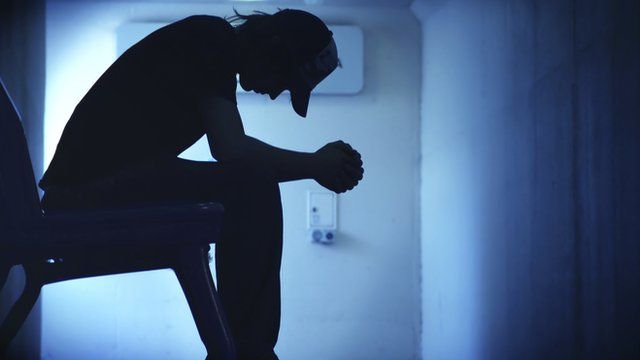Mental health deaths in detention 'avoidable'
- Published

The deaths of hundreds of people with mental health conditions who were held in detention could have been avoided, an inquiry in England and Wales found.
It focused on adults detained on psychiatric wards, in police cells and prisons between 2010-13.
The Equality and Human Rights Commission said a host of problems including basic errors and a failure to involve families were to blame.
Officials are calling for the NHS to work towards a "zero suicide" approach.
'Known triggers'
The wide-ranging report looked at people detained for a variety of reasons - for example patients admitted to hospital when their own was safety was considered to be at stake.
It included those detained in police cells and looked at people in prisons with mental health conditions too.
Between 2010-13 the analysis shows 367 adults with mental health issues died of "non-natural" causes while detained on psychiatric wards and police cells.
An inquest into Rebecca Wilson's death found that poor monitoring by her hospital gave her the opportunity to take her own life
Some 295 adults died in prison - many of whom had mental health conditions.
According to the report, non-natural deaths include suicides, deaths caused by another person, including homicide - and other deaths, for example by overdose.
Authors gathered detailed information from family members and worked with official bodies such as the Care Quality Commission (CQC), Her Majesty's Inspectorate of Constabulary and the Independent Police Complaints Commission.
Their main findings include:
- A number of basic mistakes being repeated - for example staff not adequately monitoring patients and prisoners at serious risk of suicide
- A failure to involve families or gather information that may have helped prevent deaths - such as previous treatment plans and discussions about known triggers of self-harm
- Poor communication between staff - including crucial information being lost during the transfer of prisoners
- Inappropriate use of restraint - such as the use of face-down restraint and the use of Tasers
Mark Hammond, chief executive officer of the commission, said: "This inquiry reveals serious cracks in our systems of care for those with serious mental health conditions.
"We need urgent action and a fundamental culture shift to tackle the unacceptable and inadequate support for vulnerable detainees."
The report makes a number of recommendations, including:
- Trigger systems in prisons and hospitals to alert staff to issues that could prompt self-harm, for example the anniversaries of the deaths of close relatives
- A mental health liaison officer for each police force to provide adequate training
- Much more involvement for families.
The Department of Health says it is calling on every part of the NHS to commit to a new "zero suicide" ambition.
Modelled on a depression care programme in Detroit which had no suicides for more than two years, officials hope this can be replicated more widely in England.
Health experts are also working with NHS England and the CQC in an attempt to improve the investigation system for deaths of patients in hospitals.
Separate official reviews are also being conducted surrounding the care of prisoners at risk of self-harm and young people who have died in custody since 2007.
- Published6 February 2015
- Published18 January 2015
- Published4 January 2014